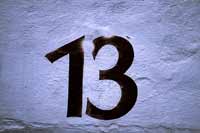Fear of number 13 develops triskaidekaphobia and ridiculous sarcasm
Europeans, especially Anglo-Saxons, are highly superstitious when it comes to the number 13. They say that if 13 people sit down at one table, one of them will die within a year. Friday the 13th is considered to be an unlucky day. The 13th day of a month, the 13th storey, the number 13, 13 coins in a purse are considered to bring ill luck. In a word, everything containing the baker’s dozen is considered to be unlucky. In Russia this number is known as the devil’s dozen. Where does it come from and why don’t other peoples believe in the magic of this number?

Triskaidekaphobia is a fear of the number 13. The words to denote this phenomenon were borrowed from ancient Greek and Latin, although at that time there was no fear of the number. People used to associate the number 12 with plentitude and completeness. There are 12 Olympic gods, 12 zodiacal signs, 12 months a year and 12 disciples. If any number is added to the “holy” number, there will be uncertainty and unpredictability. Judas was the 13th guest at the Last Supper, which was considered to be unlucky. As long as the Wicca teaching and other non-pagan movements gathered popularity in the second half of the 20th century, a theory appeared that said that there were always 13 witches in a Sabbath. However, the church has never confirmed it, nor has it tried to make the faithful believe it.
According to the Oxford Dictionary of Superstitions, the superstition connected with Friday the 13th was first mentioned in 1913, 700 years after the decline of the Order of Knights Templar. On Friday, October 13 1307 all the knights of the Temple were seized in France, which put a stopper on the order of the Knights Templar.
The only proof of 13 as the unlucky number in days of old is the fact that the 13th Tarot card is called Death. Researchers of Tarot believe that in Italy in 15-16th centuries the number 13 was associated with death, but it is not necessarily connected with the Last Supper.
Interestingly enough, the number 13 in the US history was not given any particular attention until the early 19th century. The official name of The Declaration of Independence is The Declaration of Independence of the Thirteen Colonies, and within 15 years the country was called the Thirteen United States. In the late 18th century the number 13 symbolized independence and unity of the new country. On July 4, on Independence Day, they fired 13 guns and raised glasses 13 times. Only when the 14th state Vermont was annexed in 1791, the number of toasts increased to 14.
“Until the 19th century there was another superstition connected with the number 13 – about 13 guests sitting at table,” said Nathaniel Lachenmeyer, the author of a very interesting research of the problem. In his work he told the story of ‘The Thirteen Club,’ whose members tried to debunk the absurd superstition.
In the late 19th century this superstition spread on both sides of the Atlantic Ocean. Writers from different countries, such as Wilkie Collins, Fyodor Dostoyevsky, Henrik Ibsen, Leo Tolstoy, Jules Verne and Oscar Wilde, mentioned the unlucky number in their works. In the 1880s some authoritative New Yorkers decided to refute the prejudice. The veteran of the Civil War and socialite William Fowler resolved to establish a club, whose members had dinner on the 13th days of every month, and there were 13 people at a table.
Their first dinner took place at the Knickerbocker Hotel on Friday, January 13 1881, in Room 13. It was not just a struggle against the number 13, but against other wide-spread superstitions of that time. On their way to the table the members of the club went underneath a stepladder, they spilled salt on the table and put crossed forks on every plate. On a big white poster there was a red inscription: Nos Morituri Te Salutamus (We who are about to die salute you!). Soon the club became well-known, and its members got more addicted to dangerous tricks.
The menu was presented on a gravestone, dinner tables were lit up by skull candelabrums, and lobster salad was once laid out in the form of coffins. Dinning-halls were decorated with put-up umbrellas, broken mirrors and silhouettes of black cats. In 1887 the club was extremely poplar and it counted about 487 members. In 1895 Fowler declared publicly that the number of suicides among the members of his club was lower than the average rate in the country and that 2,542 members entered the club since the moment of its foundation, and only 122 of them died for the time being. The Thirteen Club was disbanded in 1914 due to the beginning of World War I. The club’s disrespect towards death in wartime proved to be inappropriate.
Igor Bukker
Pravda.ru
Translated by Julia Bulygina
Pravda.ru
Subscribe to Pravda.Ru Telegram channel, Facebook, RSS!


